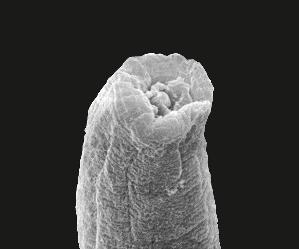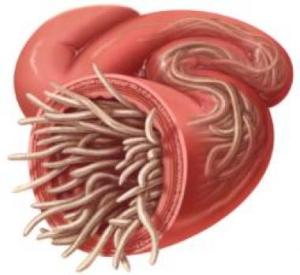Worms! One of the few things that is very likely to gross out any pet owner AND vet! Apart from making one gag at the sight of them, intestinal worms are a genuine threat to health and well-being, especially in young pups, kittens and senior pets. There are a variety of different worms which can infest our pets, including tapeworms, round worms, whip-worms, hook worms and heartworm. All of these, except heartworm, live in the gastrointestinal tract as adults, and shed their eggs in the stools of infested pets. Heartworm adults live in the heart chambers and great vessels. Occasionally the immature worms will migrate to different parts of the body, causing damage to organs as they move through.
 Image from Bayer: friendsfurever.com.au
Image from Bayer: friendsfurever.com.au
How does a pet become infested with worms?
Depending on the species of worm, your pet may become infested by eating contaminated food (e.g. raw offal), swallowing an intermediate host (e.g. fleas carry the immature tapeworms) or directly from the environment (e.g. eating some grass that has some worm eggs on it). Heartworm is transmitted in the saliva of mosquitoes when they bite and feed on our pets.
What effect does an infestation have on my pet?
 Image from diseasepictures.com
Image from diseasepictures.com
Depending on their age, general health and severity of the infestation, the effects may be fairly mild or life-threatening. Very young or old, ill and immunocompromised, and those with a very heavy worm burden are far more likely to suffer severe consequences and illness from worms. Some of the clinical signs include:
- Vomiting
- Diarrhoea
- Weight loss
- Loss of coat condition
- Pot-bellied appearance
- Anaemia
- Exercise intolerance
- Coughing
- Intestinal obstruction
- Organ failure and death
Are pets’ worms a danger to me and my family?
Yes, they most certainly are! Especially if you have young children that play in sandpits, don’t always wash their hands after playing in the dirt or patting pets, they are at risk of ingesting worm eggs or picking up ‘cutaneous larval migrans’ i.e. the immature worms hatch out in the grass and then burrow into the skin when a person comes into contact with them. These immature worms can lead to intestinal infestations but they can also migrate to all parts of the body causing damage to the liver, eyes, skin, kidneys and even brain.
What can be done?
Most importantly one needs to deworm one’s pet on a regular basis.
For intestinal worms:
- Pups and kittens: every 2 weeks until 8 weeks old, then monthly until 6 months old and then every 3 months.
- Adult dogs and cats: every 3 months
For heartworm it’s best to discuss with your vet to see which programme will be best for you, but as a general guideline:
- Dogs: Once yearly injection OR Monthly tablets/chews/topspots
- Cats: Monthly topspot
Cleaning up faeces as soon as possible, whether in the garden or in a litter tray, will reduce the load of eggs in the environment and the risk of re-infestation. Furthermore, if you suspect a worm problem in your pet contact us on 3266 9992, or your family doctor if you suspect a problem in yourself or a family member.
